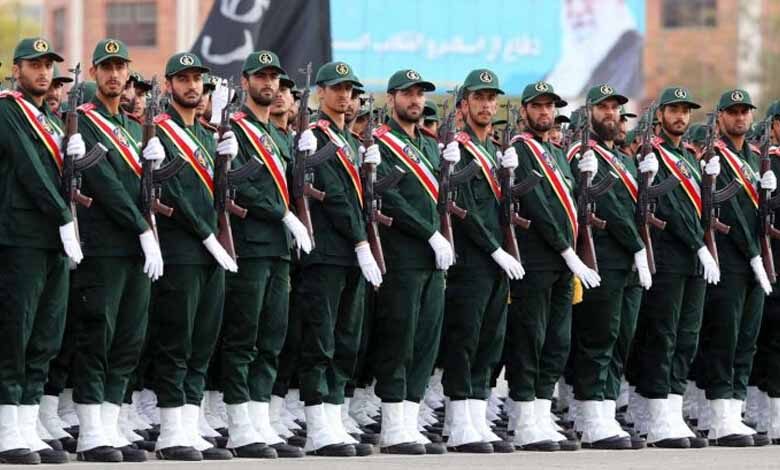Western reports: Iran’s Revolutionary Guard continues to be on terrorism list

Despite the maneuvers of the Iranians in the ongoing negotiations on the Iranian nuclear agreement, the American voices confirm that Washington will not retract the classification of the Iranian Revolutionary Guard on terrorist lists even if a nuclear agreement is reached, or torpedo this agreement, which was revealed by reports published in the Washington Post and confirmed by the Times of Israel newspaper.
According to the Washington Post, an unnamed official said that even if a lucrative deal were struck to revive the deal, Washington would not remove the IRGC from its terror lists, noting that the matter could be handled separately.
The US official said: The Biden administration will not remove the IRGC from the U.S. terror list, though it could be a break in a deal for Tehran to sign a renewed nuclear deal, asserting that Iranians know our views.
Washington has no plans to accept Tehran’s request to remove the IRGC from the US list of foreign terrorist organizations as a condition for restoring the 2015 deal, even if that means jeopardizing the agreement’s signing, the paper said, adding that even if a nuclear deal is reached, the president will abide by basic principles.
Earlier this week, US Secretary of State Antony Blinken reiterated his view that Iran’s Revolutionary Guard Corps was a terrorist group, noting that he would not be overly optimistic about signing a nuclear deal, the paper reported.
The Washington Post report asserts that Washington is not backing away from negotiations, and that there is hope that a compromise can still be found to allow the agreement to be signed, noting that while the United States does not seem to want to write off the IRGC as part of a possible nuclear deal, the issue could be treated as a separate matter if Tehran shows willingness to halt its involvement in terrorist activities that have killed thousands around the world so far, including American citizens.
The IRGC, a militant militia closely associated with Iran’s Supreme Leader, was designated a foreign terrorist organization by former President Donald Trump’s administration after its 2018 withdrawal from the nuclear deal, officially known as the Joint Comprehensive Plan of Action.
The IRGC remains officially on U.S. terrorist lists because of Iran’s actions in support of terrorist militias in the region, primarily the Houthis in Yemen and Hezbollah in Lebanon and Iraq.
On Thursday, the top Pentagon general said he opposed any potential attempt to remove the IRGC from the list of terrorist organizations.
At a congressional hearing, Joint Chiefs Chairman Gen. Mark Milley said: “In my personal opinion, I believe that the Quds Force of the Iranian Revolutionary Guard Corps is a terrorist organization, and I do not support their removal from the list of foreign terrorist organizations”.
According to the paper, it is unclear why Milley referred only to the Quds Force, while the complete removal of the IRGC is being considered by Washington as part of a possible revival of its nuclear deal with Iran.
The Times of Israel confirms that Israeli officials have openly expressed concern about the removal of the often-symbolic label, including during Blinken’s visit to Israel last month for the Negev summit.
During a press conference with the top US diplomat, Prime Minister Naftali Bennett also referred to the Houthi attacks in Saudi Arabia a week ago, which he described as horrific, confirming his fears that the Iranian Revolutionary Guard might be removed from the US terror list.
There is no green light between the United States and Israel as part of efforts to prevent Iran from acquiring a nuclear weapon and countering its threats to the region, Blinken said during the news conference. Israel has publicly said it opposes the signing of the revived agreement.
Last week, U.S. special envoy Robert Malley said Washington decided to maintain sanctions on Iran’s Revolutionary Guard even if there was an agreement to limit the country’s nuclear program.
Malley added, at a conference in Doha: “The IRGC will continue to be sanctioned under U.S. law, and our perception of the IRGC will remain”.
The so-called Joint Comprehensive Plan of Action eased Iran’s heavy sanctions in exchange for restrictions on its nuclear program to prevent it from acquiring atomic weapons, a goal Tehran denies. In 2018, the Trump administration withdrew the United States from the deal and reimposed sanctions. Iran responded by abandoning many of its commitments and increasing enrichment and other elements of the program.
The European-sponsored talks in Vienna are aimed at getting the United States back on the nuclear deal and Iran to recommit to its conditions on its nuclear program in exchange for lifting sanctions.












